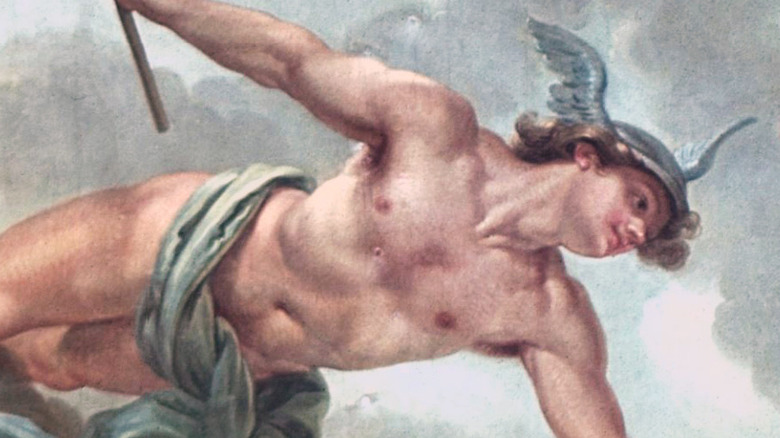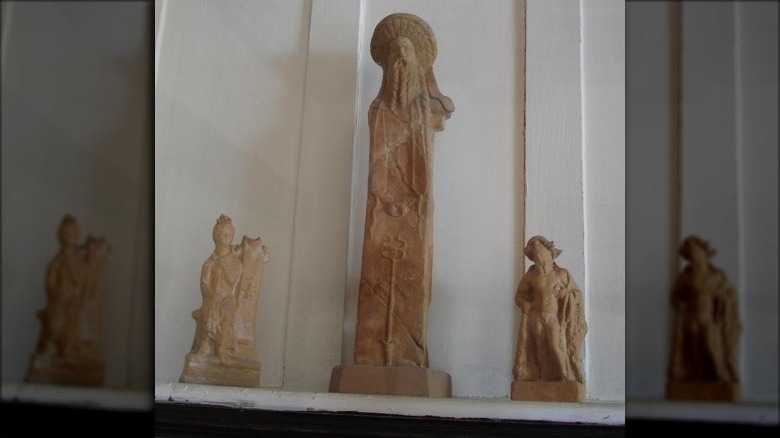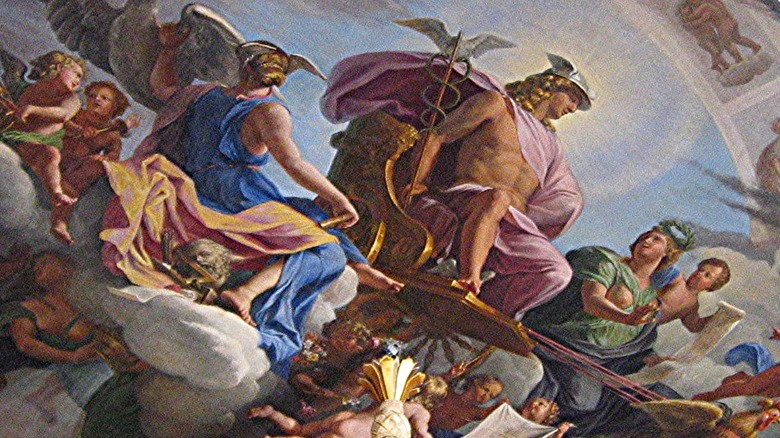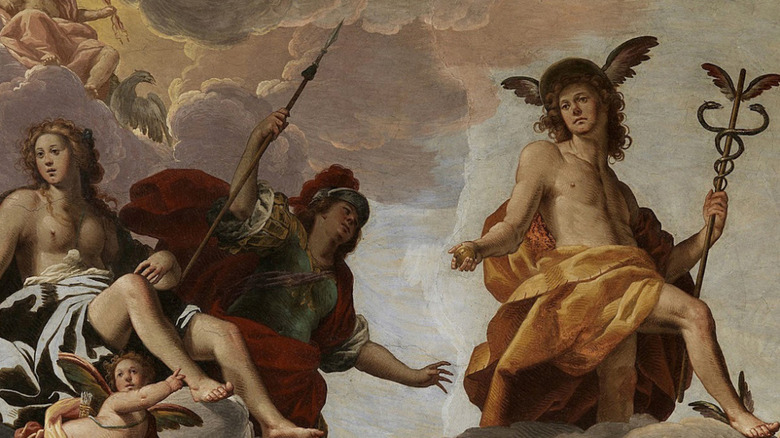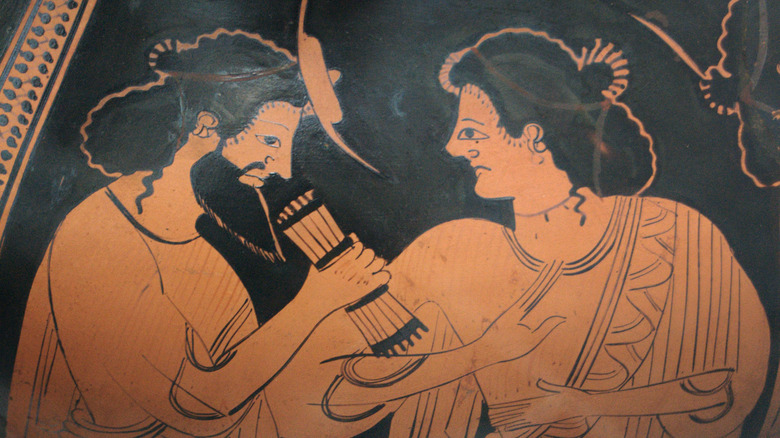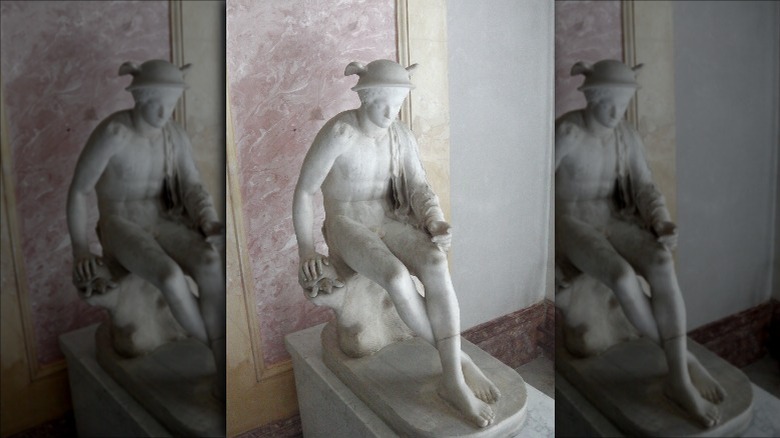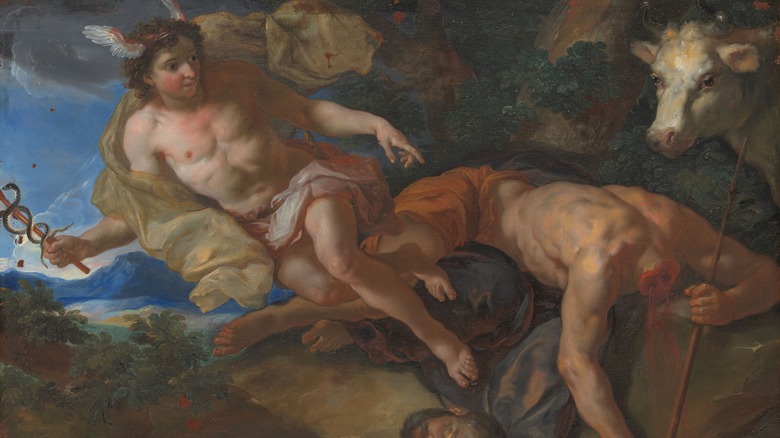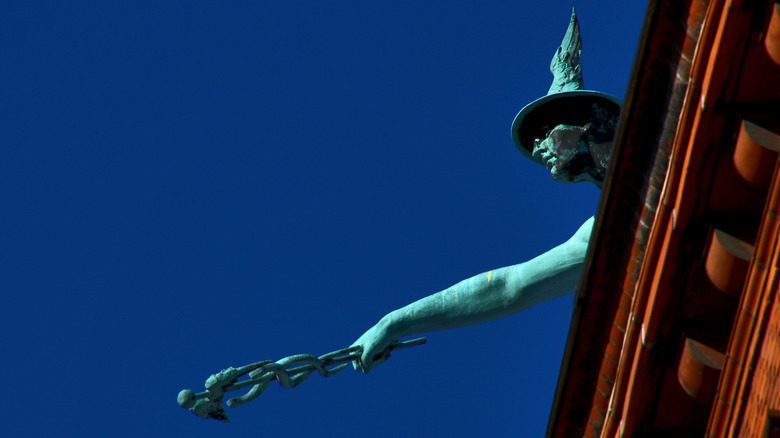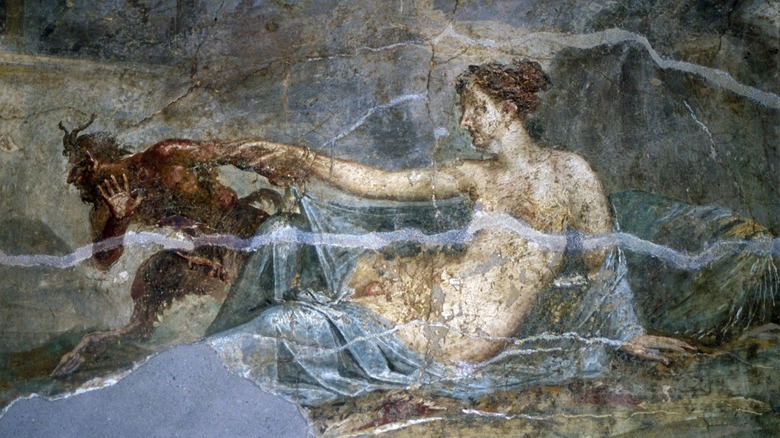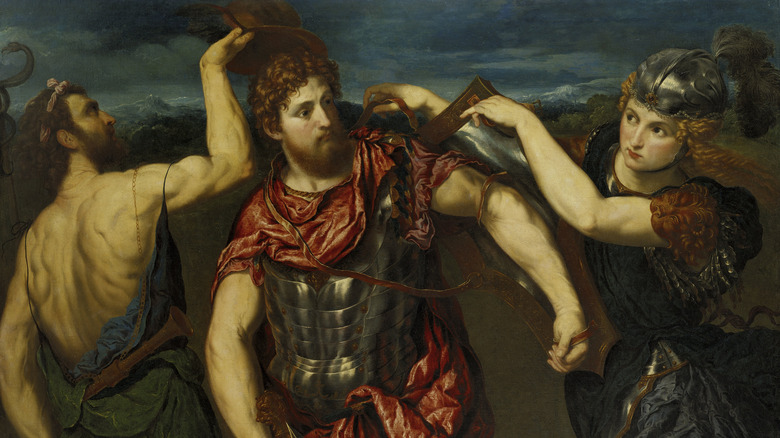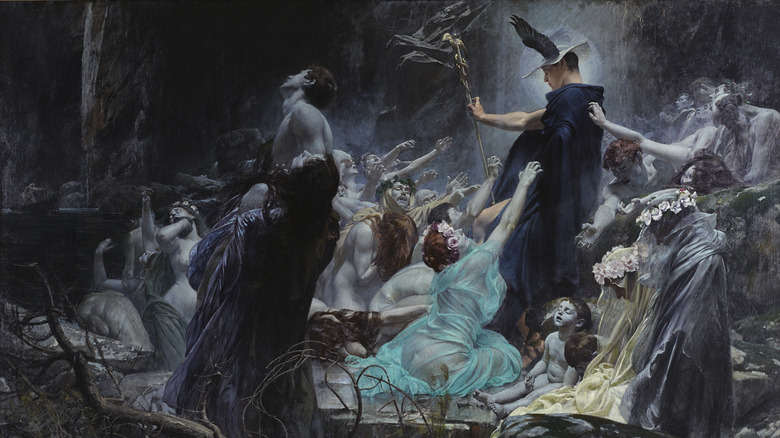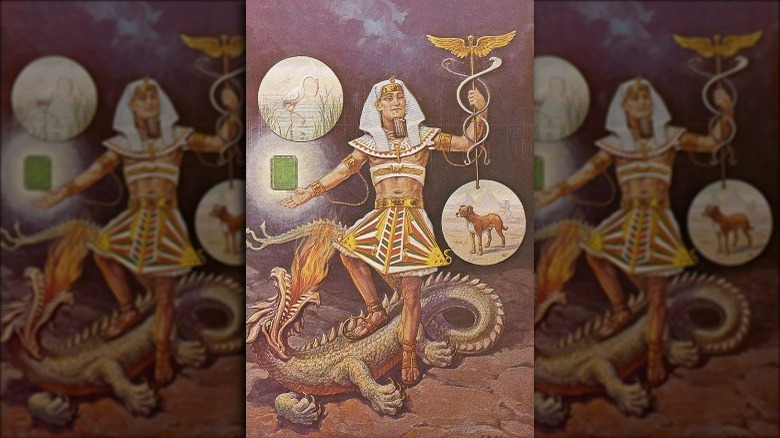The Mythology Of Hermes Explained
The Greek god Hermes, known to the Romans as Mercury, is almost instantly recognizable thanks to his famous winged sandals and broad-brimmed, almost bowl-shaped hat. Whether you see him in a logo delivering flowers or as the inspiration for the original version of the superhero the Flash, Hermes carries with him indelible associations of speed and reliable delivery.
But what does mythology actually say about Hermes? Presumably he wasn't the god of floral delivery or cool hats, so what was he the god of? Messages? Running fast? As it happens, Hermes was a god of many (metaphorical) hats, and he did a lot more than just pass on telegrams for Zeus. His purview included everyone from shepherds to athletes, from rhetoricians to thieves and merchants, and eventually to alchemists and magicians. Read on to learn what kinds of stories the Greeks and Romans actually had to tell about this wing-footed deity.
What is Hermes actually god of?
If you learned about the Greco-Roman gods as a kid, you probably learned that Hermes is the messenger of the gods, which, if you really think about it, is more like a job title than like a domain to be god over, like love or war or thunder or making things out of metal. Is he the god of delivering things? Is he the god of going fast? Well, kind of, but not really. As Theoi.com lists, the things under Hermes' purview include travelers, roads, thievery, language, merchants, and athletes, among many others. The athletes part makes sense when you think of him as the fastest runner in the world thanks to his winged sandals, but the rest might seem like a random smattering of things.
That is, at least, until you look at Hermes' origins as a mythological figure and see what the common thread is. The name Hermes (most likely) derives from the Greek herma, which was a border marker in the shape of a rectangular pillar with a bearded head of the god on top and then a wiener down below, with no other body parts or anything. With this origin in mind, it's easy to see that the fundamental idea of Hermes is a boundary-crossing god, in which case the ideas of travel, commerce, language, and even his associations with sleep and death start to make sense.
Hermes, Mercury, and Odin
The Romans identified the god that the Greeks called Hermes with their own god Mercurius, or Mercury, which the Online Etymology Dictionary explains derives from the Latin word merx, meaning "merchandise," due to the god's connection to tradesmen and thieves. This means the name Mercury is related to other English words such as commerce, merchant, and market. The closest planet to the sun was named Mercury due to its swift motion across the sky resulting from its small orbital path. The liquid metallic element mercury was subsequently named for the planet due to its fluid mobility resembling the planet's speed.
In the Romance languages such as French, Italian, and Spanish, Wednesday is named after the god Mercury: mercredi, mercoledi, and miercoles, respectively. The days of the week are named after the sun, moon, and five non-Earth planets visible with the naked eye, so it makes sense that Mercury gets one. So why do we call it Wednesday in English? You might know that Wednesday means "Odin's day" just as Thursday means "Thor's day." When the names of the week were established in English, the names of the Germanic gods considered closest to the Greco-Roman gods they were replacing were chosen. As Odin and Mercury are both gods of travelers, eloquent speech, the dead, and wearing floppy hats, Odin found himself assigned with Mercury's day.
Knowing Hermes when you see him
In a culture like pre-modern Europe where literacy can be something of a rare commodity, it can be important for people who can't read to be able to recognize their gods in art and religious artifacts so they don't accidentally sacrifice to the wrong deity and offend someone. Since you can't just put a label on the bust or fresco or whatever, representations of gods have to be clear in who they're depicting. As a result, gods end up with certain bits of iconography associated with them so you can always tell who you're looking at. Hermes is a prime example of this and actually has some of the coolest iconography of all the gods.
As Theoi.com explains, perhaps the most distinctive piece of gear Hermes could be found holding is his magical traveler's wand, known as a kerykeion in Greek and a caduceus in Latin. He is also typically dressed as a traveler, in a knee-length tunic covered with the short cloak known as a chlamys and wearing a broad-brimmed hat called a petasus. Of course, he is perhaps best known for his winged sandals or boots that allow him to fly so quickly to deliver the gods' messages. His wand and hat are also commonly depicted as having wings. An animal associated with Hermes that he is often depicted with in art is, somewhat ironically for the fleet-footed god, the tortoise.
The birth of Hermes
If you had to just take a wild stab at it, you could probably guess without much trouble that Hermes' father was Zeus, the king of the gods and father of about 75% of all sentient beings within Greco-Roman myth. His mother, however, is somewhat more obscure. According to Theoi.com, Hermes' mother was Maia, one of the seven daughters of the Titan Atlas and the sea nymph Pleione known as the Pleiades (yes, the ones the star cluster is named after). Because he is the grandchild of Atlas (yes, the one that holds up the sky), Hermes is sometimes called by the epithet Atlantiades, or "son/descendant of Atlas."
The ancient poem known as the "Homeric Hymn to Hermes" says that Maia was a shy goddess who avoided the company of all the other gods by hiding in a deep, dark cave within Mount Cyllene, where the Pleiades lived. The only god who knew she was there was Zeus, who would come and sleep with her while his wife Hera was asleep. Needless to say, this situation eventually led to the birth of a baby, but not just any baby. The "Homeric Hymn" describes him as "a son, of many shifts, blandly cunning, a robber, a cattle driver, a bringer of dreams, a watcher by night, a thief at the gates." And sure enough, within a day, this divine schemer was scheming schemes.
Making trouble from day one
As the World History Encyclopedia explains, at only half a day old, the baby Hermes was already making trouble. Having snuck out of his mother's cave, Hermes makes his way to Pieria, where he finds and subsequently steals 50 of his half-brother Apollo's sacred cattle. To cover his tracks, Hermes makes the cows walk backwards and fashions shoes out of wood brush to sweep away his own footprints. Eventually, the young Hermes hides the cattle (minus two that he sacrificed, during which process he invented the idea of starting a fire by rubbing sticks together) in a small grotto, but after a while Apollo manages to track his cows down and, thanks to a shepherd who snitched, is able to figure out that Hermes stole them. And despite Hermes' best "but I'm just a widdle baby" routine, Apollo still brings the matter to trial before their father, Zeus.
Fortunately, earlier in the day, the baby Hermes had also come across a tortoise, which he thought was hilarious (this story is possibly why the god is associated with this particular animal). He also thought it was hilarious when he scooped all its guts out and used its shell to invent the lyre, basically the instrument of the ancient Greeks. Hermes gave the lyre to Apollo, the god of music, who gladly accepted and let Hermes keep the cattle, parting as friends.
Slaying the eye monster
Apart from his childhood hijinks, in most myths Hermes features as something of a sidekick, helper, or travel companion to his father Zeus rather than a solo protagonist. One of the most notable of these stories is the origin of one of Hermes' most famous nicknames, Argeiphontes. According to GreekMythology.com, Zeus became enamored of a princess named Io and so went down to Earth to give her a little quality time. However, Zeus' wife Hera soon became suspicious and went to see what Zeus was up to. To cover up his misdoings, Zeus quickly transformed Io into a white cow and said that he had obtained this beautiful animal as a gift for Hera.
Pretending to take him at his word, Hera thanked him for the gift and set up a guardian ostensibly to protect such a fine gift, but really to keep Zeus from changing her back into a hot girl. This guardian was the monster Argos, whose body was covered with 100 eyes, which took turns sleeping so that he was always vigilant. Zeus summoned Hermes to help, and the messenger god lulled Argos fully to sleep with a litany of tales. Once Argos was snoozing, Hermes killed him, earning the name Argeiphontes, or "Argos-slayer." Hera preserved the eyes of her faithful servant by putting them on the tail of her sacred bird, the peacock.
Hermes' staff isn't for doctors
One of the most recognizable attributes of Hermes is his staff, known as the caduceus. As Classical Wisdom explains, this staff, wand, or rod was known by the Greeks as the kerykeion, or herald's wand, and appears in artistic depictions of Hermes as early as the sixth century BCE. In the earliest depictions, this simple rod or branch was often entwined with ribbons or garlands, but in time these became interpreted as snakes, perhaps due to the ancients' associations between snakes and divine power, or else because of the slithering serpents' apparent speed. At any rate, the staff–to which many myths attribute the magical ability to cause or remove sleep–became a symbol of peace due to its association with the god of messengers and diplomats.
In the modern era, however, Hermes' caduceus is most often seen as a symbol of the medical profession, appearing as it does on the symbol for the U.S. Medical Corps, many pharmacies, and other medical services. This, however, is due to a confusion between Hermes' wand and the Rod of Asclepius, the god of healing, which has a single snake entwined around it. This is obviously a pretty easy mistake to make–one snake vs. two snakes–but there is some irony in the fact that the medical industry accidentally adopted as its symbol the sign of the god of thieves and commerce.
Hermes' famous lovers and children
According to the classic myths, Hermes never married, but that's not to say he never had lovers, and like his father and half-brothers, he had a grip of children with them. While not all of them are world famous, he does have a fair few notable consorts and offspring. As GreekMythology.com records, one of the most famous sons of Hermes is the goat-footed god Pan, the sylvan patron of shepherds, whom Hermes had with a nymph, usually named Dryope. Another child whose name gives away their parentage is Hermaphroditus, the offspring of Hermes and Aphrodite who, while born a boy, got literally tangled up with a water nymph who loved him and became the intersex figure that still bears their name.
Another interesting story comes from when Hermes and Apollo both fell in love with the beautiful Chione and slept with her on the same day. She subsequently became pregnant with twins, each with a different divine father. Her son Philammon became a musician like Apollo, while her other son Autolycus became a notorious thief and trickster like his father Hermes. Autolycus was subsequently the grandfather of Odysseus, famous for his many wiles and described as polytropos ("of many turns," signifying both his cleverness and his wandering around the world) in "The Odyssey" just as Hermes is in the "Homeric Hymn."
Hermes gives heroes a helping hand
Another one of Hermes' primary roles in mythology is as a helper to the great heroes of legend, a job he sometimes performs in tandem with his half-sister Athena, who is also renowned as a patron of heroes. As Theoi.com explains, probably his most famous help to a hero comes in "The Odyssey" when he helps his great-grandson Odysseus avoid being transformed into a pig by the witch Circe as his crew all had been by directing him to the holy herb known as moly. In addition to that, Hermes (often accompanied by Athena) helped the young hero Perseus in his quest to kill the Gorgon Medusa by either giving or directing him toward magical items to aid him in his quest, including his own flying sandals, an unbreakable scimitar, a bag of holding, and a hat belonging to Hades that made him invisible.
Hermes likewise helped Heracles in his final labor to fetch Cerberus, the hound of Hell, from the house of Hades by guiding him and protecting him from harmful spirits. During the Trojan War, Hermes gave advice and protection to the Trojan king Priam as he navigates the Greek camps to retrieve the body of his son Hector from Achilles, even though Hermes himself supported the Greeks in the war, in character with Homer's depiction of the messenger god as "Hermes the kindly."
Bringing in the dead
One of the other well-known aspects of Hermes' divinity is his role as a psychopomp, or conductor of souls, meaning that it is his job to lead the souls of the recently dead to the Underworld, like the Greek equivalent of the Grim Reaper. According to Theoi.com, this role derives from his position as the god of herdsmen, as the leap from driving sheep and cattle where they should go to ushering human souls into their new eternal pen is a short one, but it's not hard to see how the role of leading people across the boundary from alive to dead would fall to the god of crossings and transitions. Within the context of myth itself, Hermes was assigned the task of protector of ghosts after he was the one to bring Persephone back to her mother Demeter following her abduction by Hades.
It was under this role that Hermes was able to conduct Heracles to the Underworld in order to fetch Cerberus, and likewise it was due to this position that he was assigned to bring the trickster Sisyphus back to Hades after he had managed to escape for the second time. In a lesser-known story, Hermes also guides the ghost of Protesilaus, the first man to die in the Trojan War, to visit his wife Laodamia, who had begged the gods to let her talk to her husband one last time.
Hermes gets fabulous
Aesop, the famous writer of fables, would often use Hermes as a character in his brief moralistic tales, perhaps because his role as a pastoral god of travelers suited the frequently rural settings of many of his stories. Theoi.com collects these fables in one place, including what is perhaps the most famous one, which tells of a woodcutter who accidentally drops his ax in a river. As he sits there crying at his own foolishness, Hermes appears and tells him that he will help him out. Hermes dives into the river and comes back up with an ax made of gold. The man denies that the golden ax is his, so Hermes dives again and this time comes back with a silver ax. The man likewise says that this treasure doesn't belong to him, so Hermes goes under for a third time and comes back with the woodcutter's own ax. As a reward for his honesty, Hermes gives the man all three axes. When one of the woodcutter's friends hears the story, he intentionally throws his ax in the water and tries to claim the golden ax for himself when Hermes presents it. For his greed and dishonesty, Hermes leaves without even fetching this man's actual ax.
Other stories see Hermes assigned to distribute intelligence to humankind and a pinch of deceit to all craftsmen and merchants.
Egyptian Hermes was great-great-great
As the Greeks and later the Romans spread their influence throughout the Mediterranean world through conquest, it was very common for them to see similarities between their own gods and those of the territories being absorbed into their empire. As a result, the Greco-Roman god and the local god would often come to be seen as two aspects of the same god, a process which the Encyclopedia Britannica explains is known as syncretism. This was especially common in the Hellenistic period following the conquests of Alexander the Great between the Greek and Egyptian gods. And as Encyclopedia.com explains, the Egyptian god syncretized with Hermes was Thoth, the god of wisdom, writing, and magic. This focus on the linguistic aspect of Hermes led to him being seen as a god of language and translation, so that even today the study of translation and interpretation is known as hermeneutics.
Hellenistic Egyptians began to see Thoth-Hermes as a god of wisdom and secret learning, eventually bestowing upon him the epithet Trismegistus, or "thrice-greatest." The figure of Hermes Trismegistus would come to be completely separate from the Greek messenger god, becoming the purported author of a huge body of mystical writings on topics such as alchemy and astrology. The secret nature of his writings was so tight that even today, something in an airtight container is said to be hermetically sealed.
